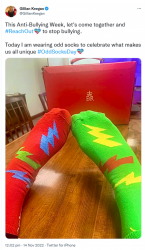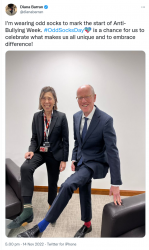Key DfE players take to virtue signalling on Twitter to mark the start of Anti-Bullying Week, but fail to see the irony in their own Department’s attitude towards those being educated outside the school system
What’s been said?
 Changes in all government departments have taken place at lightning speed this year. The Department for Education is no exception. Sam Freedman (a former senior policy adviser at the DfE and a senior fellow at the Institute of Government) reviewed some of these in a TES article on 7 November.
Changes in all government departments have taken place at lightning speed this year. The Department for Education is no exception. Sam Freedman (a former senior policy adviser at the DfE and a senior fellow at the Institute of Government) reviewed some of these in a TES article on 7 November.
On 14 November, recently appointed Secretary of State for Education Gillian Keegan marked the start of Anti-Bullying Week with a Tweet of herself wearing odd socks, along with the words:
“This Anti-Bullying Week, let’s come together and #ReachOut to stop bullying. Today I am wearing odd socks to celebrate what makes us all unique #OddSocksDay”
 Later that day, Diana Barran, Parliamentary Under-Secretary of State and Minister for the Schools System (including home education), tweeted a picture of herself and the re-appointed Nick Gibb (Minister of State for Schools) both sporting odd socks, with the words:
Later that day, Diana Barran, Parliamentary Under-Secretary of State and Minister for the Schools System (including home education), tweeted a picture of herself and the re-appointed Nick Gibb (Minister of State for Schools) both sporting odd socks, with the words:
“I’m wearing odd socks to mark the start of Anti-Bullying Week. #OddSocksDay is a chance for us to celebrate what makes us all unique and to embrace difference!”
Why does it matter?
Freedman’s title “Why the new DfE team has big problems” conveys his overall view of things. He sees the present line-up as an improvement on the last iteration, but his terse summary of the way ahead is not optimistic: “They only have two problems: no money and no time.”
This Byte will not unpack that analysis further, however. Rather, we wish to highlight the irony of DfE Ministers bending over backwards to “celebrate what makes us all unique” and to “embrace difference” in one sector of their work, whilst demonstrating bias, prejudice and an unwillingness to do the same in regard to elective home education.
In no way do we wish to downplay the seriousness and wide-ranging effects of bullying on the lives and well-being of individual young people. Ditch the Label’s 2020 Annual Bullying Survey reports a 25% year on year increase, based on their 2019 data for victimisation. (Whilst Ditch the Label is a global youth charity, this survey is described as “an invaluable benchmark of bullying behaviours in the United Kingdom.”)
But how can it be consistent for the DfE to advocate celebrating uniqueness and difference in some young people whilst actively discriminating against parents and families who, for whatever reason, have opted to fulfil their responsibilities for their children’s education outside the state system? In the preface to the recently published Centre for Social Justice Report, which is misleadingly entitled “Out of sight and out of mind” Dame Rachel de Souza, Children’s Commissioner for England, stated:
“In the CSJ’s research, we heard of many instances where parents took their children out of school because they believed that school was no longer a safe environment. Many parents cite difficulties with accessing SEND provision, a lack of support for mental health and serious incidences of bullying as reasons for opting for home education. These parents feel that schools are failing to meet their children’s needs.” [Emphasis added]
The proposals for registers of Children Not in School outlined in Part 3 of the Schools Bill, 2022 and Part 4’s measures to regulate out of school settings may be in abeyance for the time being, but there is evidence that the underlying agenda has not gone away.
A worrying lack of respect for parents and parental choice prevails amongst children’s professionals and much of the DfE hierarchy. There seem to be some blind spots when it comes to believing that parents know their own children best, and that in the vast majority of cases they will act with their best interests at heart.
An increasingly large percentage of the young people being successfully educated outside the school system, be that entirely family-based or in partnership with small learning communities, are there precisely because of failings within the school system. As acknowledged by the Children’s Commissioner, factors such as lack of access to mental health support, or the inadequacy of provision for those with special educational needs or repeated failures to address serious social issues such as bullying have motivated many parents to withdraw their children.
Parents will not sit idly by for ever, watching their children endure daily misery. If all other efforts to resolves the issues fail, they will look for alternatives. In August 2005 the Guardian highlighted that a new report had identified bullying was “the main reason for parents taking their children out of school to educate them at home.”
Seventeen years later, the problems in schools have only increased, but it appears that rather than taking parents’ concerns seriously, the new team of education ministers prefer to wear non-matching socks. In the meantime, whilst the Schools Bill, with its threats of fines and imprisonment for non-compliant parents, appears to have been taken off life support, the Government has failed to issue its death certificate.
What can I do?
If you want to bring yourself up to date with key players at the DfE these days, Freedman’s article is worth a read. [Readers can register with the Tes for and read two articles for free each month.] Otherwise SchoolsWeek lists all their briefs without comment in this piece.
If you prefer, details of individual ministerial appointments on the DfE website will tell you that Gillian Keegan is Secretary of State for Education, with overall responsibility for everything; Nick Gibb is Minister of State for Schools; Robert Halfon (previously Chair of the Education Committee) now covers Skills, Apprenticeships and HE; Claire Couthinho handles Children, Families and Wellbeing (including SEND) and Baroness Diana Barran has School System and Student Finance (including home education).
Our main point in closing would however be to stress the importance of being aware of the increasing pressure for state oversight of the lives and learning of all children. “Knowing,” regulating, monitoring and standardising are seen as essential virtues, whilst difference and reaching a destination by another route is tolerated less and less by a system which seems to think of itself as the arbiter of all things educational – even all things family.
So the odd socks week will pass until this time next year, but the ironies of a system which claims to celebrate difference, but in reality does anything but when it comes to those children outside state-supervised schools, demand more serious consideration by parents.
Whose children are they, after all?


